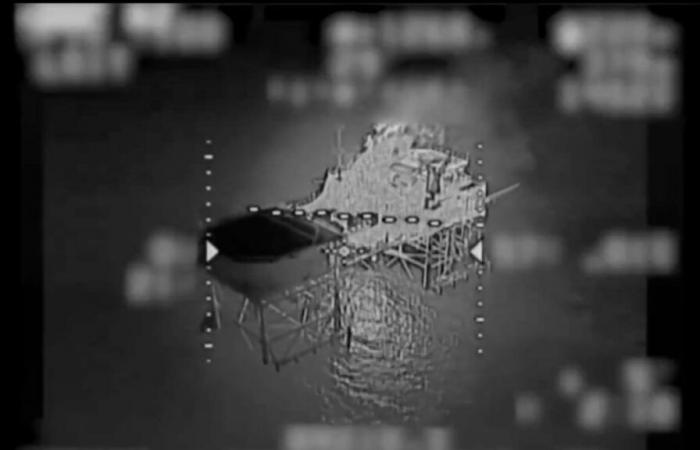After having greatly decimated the Russian fleet in the Black Sea, Ukraine's naval surface drones were getting a little bored. Fortunately, the kyiv navy has found a new activity for them: destroying the Russian offshore platforms which are illegally siphoning off Ukrainian natural gas reserves, off the coast of Crimea occupied since 2014 by Russia, reports the American magazine Newsweek. A new mission for machines emblematic of the military technological progress made by Ukraine since its aggression by its Russian neighbor.
“The hunt for the enemy in the Black Sea continuespublished on Saturday December 7 the command of the Navy of the Ukrainian Armed Forces on Facebook, supporting video (see below). Naval drones carried out precise strikes on Russian targets. Enemy surveillance systems located on captured gas platforms near the coast of temporarily occupied Crimea have been destroyed. The occupiers will not stay on our territory, we will have them everywhere.” The message got through.
Subscribe for free to the korii newsletter!Don't miss any korii articles thanks to this daily selection, directly in your inbox.
In the video which accompanies the publications on social networks, we can see Ukrainian maritime drones, remotely piloted and loaded with explosives, en route to offshore gas platforms in the Black Sea, then strong explosions which cause the fire of at least one of these platforms. For the first time, we also see an aerial drone taking off from one of the surface naval drones and pursuing two individuals present on the platform, before the image cuts off, presumably after its explosion.
The naval battle diversifies
The naval drones in the video closely resemble “Sea Baby” type devices, developed at the initiative of the Security Service of Ukraine (SBU, domestic intelligence agency), shortly after the Russian invasion of February 2022. In March 2024, the SBU announced the arrival of “Sea Baby 2024”, “a new generation drone, improved and even more deadly for the enemy”. Massively used against the Russian Black Sea fleet, the latest models are supposed to be able to transport up to a ton of explosives with a range of around 1,000 kilometers, according to the Ukrainian specialist media Defense Express.
It would seem that the most recent versions of Ukrainian naval surface drones are therefore capable of serving as a basis for light aerial drones, but also of waging new types of battle, as also explained by the Ukrainian online media The Kyiv Independent . A video shared by the SBU on Monday, December 9 shows a Ukrainian operation carried out a few days earlier near the Kerch Strait (in eastern Crimea), during which maritime craft attempted to repel a helicopter attack Russians by shooting at them, using an on-board automatic weapon.
“On the night of December 5-6, a group of SBU maritime drones engaged in combat with Russian Raptor-class helicopters, planes and patrol boats trying to intercept themspecifies the Ukrainian Ministry of Defense on X (formerly Twitter). The “Sea Baby” drones were equipped with large-caliber machine guns with ballistic programs for automatic targeting and target-locking capabilities.”
In a statement made on May 9, 2024, Andriy Yusov, spokesperson for the General Intelligence Directorate of the Ministry of Defense of Ukraine (HUR MOU), argued that Ukrainian naval surface drones had already caused at least $500 million ( approximately 475 million euros) in damage to Russia. Citing for the occasion the Magura V5 version, just as formidable in the Black Sea, the Ukrainian official described it as “the main and best weapon that Ukraine has to fight the Russian fleet”.
Several hundred kilometers further east and yet without direct access from Ukraine, kyiv's maritime drones would also have hit the Russian fleet… on the shores of the Caspian Sea. At the beginning of November, some reportedly managed to reach the port of Kaspiysk, located in the republic of Dagestan (southwest Russia), and damaged the missile ships Dagestan et Tatarstan– according to official Ukrainian press releases, necessarily to be taken with a pinch of salt.






